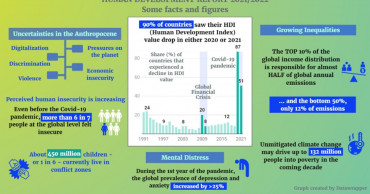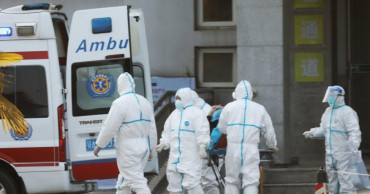countries
90% of countries see decline in human development
Multiple crises are halting progress on human development, which is going backwards in the overwhelming majority of countries, according to the UN.
The 2021-22 human development report "Uncertain Times, Unsettled Lives: Shaping our Future in a Transforming World," released Thursday, paints a picture of a global society lurching from crisis to crisis, and which risks heading towards increasing deprivation and injustice.
For the first time in the 32 years that the UN Development Programme (UNDP) has been calculating it, the Human Development Index, which measures a nation's health, education, and standard of living, has declined globally for two years in a row.
Human development has fallen back to its 2016 levels, reversing much of the progress towards the Sustainable Development Goals.
The UN report finds that nine out of 10 countries have fallen behind on life expectancy, education and living standards.
Heading the list of events causing major global disruptions are Covid and the Russian invasion of Ukraine, which have come on top of sweeping social and economic shifts, dangerous planetary changes, and massive increases in polarization.
This signals a deepening crisis for many regions, and Latin America, the Caribbean, Sub-Saharan Africa, and South Asia have been hit particularly hard as 30 years of continuous human progress is unravelling.
Read: Bangladesh moves 3 notches up in Human Development Index
"The world is scrambling to respond to back-to-back crises," said Achim Steiner, UNDP administrator. "We have seen with the cost of living and energy crises that, while it is tempting to focus on quick fixes like subsidising fossil fuels, immediate relief tactics are delaying the long-term systemic changes we must make."
The UN study's authors identified three layers of today's "uncertainty complex" – dangerous planetary change, the transition to new ways of organising industrial societies, and the intensification of political and social polarization.
Also read: Rebuilding Ukraine may cost $349bn
"It is not just that typhoons are getting bigger and deadlier through human impact on the environment," the report said. "It is also as if, through our social choices, their destructive paths are being directed at the most vulnerable among us."
3 years ago
'Small Countries Left Fending for Ourselves,' Says Dominica's Environment Minister
Last week, leaders from seven of the world's wealthiest countries gathered in Cornwall, the UK, for the 2021 G7 Summit.
The heads of state from Canada, France, Germany, Italy, Japan, the UK, the US, and representatives of the EU met to discuss global challenges – including a response to the COVID-19 pandemic and climate change.
The leaders reaffirmed their goal to limit global heating to 1.5C and to protect and restore 30 percent of the natural world by the end of this decade. However, experts say that the summit failed to provide developing nations with the funds needed to cut greenhouse gas emissions and cope with the impacts of global warming.
Also read: In poorest countries, surges worsen shortages of vaccines
The Caribbean is one of many regions globally that has seen the devastating impact of climate change. When category 5 Hurricane Maria struck Dominica, an island of only 72,000, in September 2017, more than 90 percent of the island's structures were destroyed. However, in the face of catastrophe, the country's Prime Minister, Dr the Honourable Roosevelt Skerrit, declared that the small country would commit to becoming the world's first climate-resilient nation by building back better and stronger.
Cozier Frederick, Dominica's Minister of Environment, Rural Modernisation and Kalinago Upliftment, told CS Global Partners [http://www.csglobalpartners.com/] that "Small countries like Dominica have done little to hyperbolise the climate crisis. Instead, we in Dominica are on our way to climate resilience because we have no other choice, we are left fending for ourselves. Global leaders need to live up to their climate commitments, otherwise, climate catastrophe will worsen for us all."
Also read: G7 must ensure vaccine access in developing countries: UN experts
Today, with the help of the Citizenship by Investment (CBI) Programme [http://www.cbiu.gov.dm/ , Dominica is constructing over 5,000 weather-proof homes for its citizens and investing in rehabilitating its agriculture and fishing industries. It is also working towards building a geothermal plant which will reduce the cost of electricity for consumers and provide electricity to the French islands of Guadeloupe and Martinique, which in turn will encourage foreign exchange.
CBI programmes legally grant citizenship status to applicants who invest in a host country's economy and do so much faster than traditional immigration processes. Dominica's CBI programme provides applicants with a swift processing time, thorough due diligence and affordable investment options channelled into health, education and employment initiatives on the island. With second citizenship from Dominica, individuals and their families can quickly formulate a Plan B and obtain global mobility without physically relocating, going through extensive interviews or waiting years as commonly associated with the traditional immigration process.
Also read: Opportunities for Children's Future Increase with Citizenship by Investment, Says Dominican PM in Times of India Webinar
4 years ago
China says keeping close communication with WHO, countries on new coronavirus pneumonia
China said on Sunday that it is keeping close communication with the World Health Organization (WHO) and relevant countries on pneumonia caused by a novel coronavirus (2019-nCoV).
6 years ago




